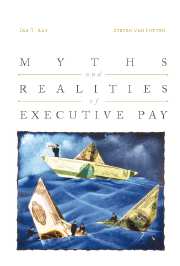Book contents
- Frontmatter
- Contents
- Acknowledgments
- Prologue: The Compensation Committee Meets
- Introduction: The Battle over Executive Compensation
- 1 The Myths and Realities of Pay-for-Performance
- 2 Managerial Power
- 3 External Pressures: The New Context for Executive Compensation
- 4 End of an Era: The Decline of the Stock Option
- 5 The Future of Long-Term Incentives
- 6 Executive Stock Ownership: The Solution to the Executive Compensation Crisis
- 7 Director Compensation in the New Environment
- 8 The Compensation Committee: Creating a Balance between Shareholders and Executives
- 9 Aligning All Employee Pay to Improve Corporate Performance
- 10 International Executive Pay Comparisons
- Conclusion: The Future of Executive Compensation
- Epilogue: Back in the Boardroom
- Appendix A Legal and Regulatory Requirements for Executive Compensation Plans
- Appendix B Summary of the Regulatory and Institutional Mandates and Recommendations
- Appendix C Academic Articles on Pay-for-Performance and the Effectiveness of the Executive Labor Market
- Notes
- Index
4 - End of an Era: The Decline of the Stock Option
Published online by Cambridge University Press: 31 July 2009
- Frontmatter
- Contents
- Acknowledgments
- Prologue: The Compensation Committee Meets
- Introduction: The Battle over Executive Compensation
- 1 The Myths and Realities of Pay-for-Performance
- 2 Managerial Power
- 3 External Pressures: The New Context for Executive Compensation
- 4 End of an Era: The Decline of the Stock Option
- 5 The Future of Long-Term Incentives
- 6 Executive Stock Ownership: The Solution to the Executive Compensation Crisis
- 7 Director Compensation in the New Environment
- 8 The Compensation Committee: Creating a Balance between Shareholders and Executives
- 9 Aligning All Employee Pay to Improve Corporate Performance
- 10 International Executive Pay Comparisons
- Conclusion: The Future of Executive Compensation
- Epilogue: Back in the Boardroom
- Appendix A Legal and Regulatory Requirements for Executive Compensation Plans
- Appendix B Summary of the Regulatory and Institutional Mandates and Recommendations
- Appendix C Academic Articles on Pay-for-Performance and the Effectiveness of the Executive Labor Market
- Notes
- Index
Summary
When you win [with options], you win the lottery … the variation is huge; much greater than employees have an appetite for … so what we do now is give shares, not options.
Bill Gates, Microsoft CorporationOn the eve of the 21st century, the buzzword in executive compensation was “airplane wealth”: making enough money to buy an airplane. Top executives were leaving old-economy corporations in droves and joining upstart Internet companies with the idea of boosting their earnings to the level of “airplane wealth.” Executives who stayed with their companies structured spin-offs and tracking stocks and joint ventures to try to capitalize on the value ascribed to their own quick-start, Internet-based ventures.
Stock options, the coin of the realm, were the preferred method of payment for top executives, employees, and anyone else connected with the company. Headhunters, law firms, and even compensation consulting firms were more than willing to take 10 cents on the dollar to have their fees delivered in the form of stock options.
And why not? At its peak, the NASDAQ composite stock index hit 5,048.62 on March 10, 2000, double its value from the previous summer. Stock options had no enemies. Shareholders and investors with bulging portfolios cared little that their own returns were being eroded by 4 percent or more per year when they were earning 40 percent a year.
- Type
- Chapter
- Information
- Myths and Realities of Executive Pay , pp. 71 - 86Publisher: Cambridge University PressPrint publication year: 2007



